
Journal of Investing
Scope & Guideline
Illuminating the future of investing with cutting-edge research.
Introduction
Aims and Scopes
- Investment Strategy and Portfolio Management:
Explores various investment strategies, including asset allocation, risk management, and performance evaluation techniques. The journal emphasizes empirical studies that assess the effectiveness of these strategies in real-world scenarios. - Behavioral Finance and Investor Psychology:
Investigates the psychological factors influencing investor behavior, such as biases, sentiment, and decision-making processes. This area seeks to understand how these factors impact market outcomes and investment performance. - Integration of ESG Factors in Investing:
Focuses on the incorporation of Environmental, Social, and Governance (ESG) criteria into investment decision-making. Research in this area aims to evaluate the performance of ESG investments and their implications for traditional finance. - Technological Advancements in Investing:
Covers the influence of technology on investment practices, including algorithmic trading, machine learning applications, and the use of blockchain in finance. This scope reflects the journal's commitment to exploring innovative approaches to investing. - Alternative Investments and Emerging Markets:
Examines the role of alternative assets, such as cryptocurrencies, private equity, and hedge funds, in portfolio diversification and risk management. Research in this area also addresses the unique challenges and opportunities presented by emerging markets.
Trending and Emerging
- Cryptocurrency and Blockchain Investments:
Research on cryptocurrencies and blockchain technology is increasingly prominent, with studies exploring their role as alternative investments and their implications for portfolio diversification. The growing interest in digital assets highlights their potential impact on traditional investment paradigms. - Behavioral Insights in ESG Investing:
Emerging studies are delving into the behavioral aspects of ESG investing, examining how psychological factors influence investor decisions regarding socially responsible investments. This trend underscores the significance of understanding investor sentiment in the context of sustainability. - Data-Driven Investment Strategies:
There is a notable increase in research focused on utilizing big data and machine learning techniques to enhance investment strategies. This trend reflects the integration of advanced analytics into investment decision-making processes, allowing for more informed and precise portfolio management. - Risk Management Innovations:
Innovative approaches to risk management, including the use of advanced quantitative models and dynamic hedging strategies, are gaining traction. This trend indicates a shift toward more sophisticated risk assessment methods that adapt to market volatility. - Impact of Macroeconomic Factors on Investments:
Research examining the influence of macroeconomic conditions on investment performance is on the rise, with studies exploring the interactions between economic indicators and asset returns. This theme emphasizes the importance of understanding the broader economic environment in investment strategies.
Declining or Waning
- Traditional Active Management:
Research focusing solely on traditional active management strategies and their performance metrics seems to be less frequent. There is a noticeable shift towards exploring hybrid approaches that combine active and passive strategies, reflecting the evolving preferences of investors. - Conventional Risk Metrics:
The use of classical risk measures, such as standard deviation and beta, is becoming less prevalent in favor of more innovative and comprehensive risk assessment techniques. This decline indicates a broader acceptance of multifactor risk models and advanced analytics. - Static Asset Allocation Models:
Static models of asset allocation that do not account for dynamic market conditions are appearing less frequently. Researchers are moving toward adaptive strategies that consider changing market dynamics and investor behavior, highlighting the need for more responsive investment frameworks.
Similar Journals

International Review of Finance
Empowering economists and financiers with cutting-edge insights.International Review of Finance is a prestigious academic journal published by Wiley, located in the United Kingdom. With its ISSN 1369-412X and E-ISSN 1468-2443, this journal serves as an essential platform for researchers and practitioners in the fields of Economics and Finance. Ranked in the Q2 quartile for both Economics and Econometrics and Finance as of 2023, it showcases high-quality research that contributes significantly to theoretical and practical advancements. Reflecting its standing, the journal is positioned in the 61st percentile in Economics and Econometrics and the 60th percentile in Finance according to Scopus rankings. The scope of the journal includes a diverse range of topics, encouraging innovative discourse across various financial disciplines. Although it does not offer open access, the International Review of Finance continues to be an important resource for academics, professionals, and students seeking to deepen their understanding of evolving financial theories and practices.
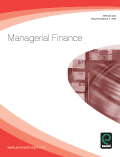
MANAGERIAL FINANCE
Shaping the Future of Managerial Finance.MANAGERIAL FINANCE is a prestigious academic journal published by Emerald Group Publishing Ltd, focused on the areas of finance, management, and strategy. With an ISSN of 0307-4358 and an E-ISSN of 1758-7743, this journal has carved a niche for itself within the business and financial sectors, achieving a commendable Q2 category ranking across multiple domains, including Business, Management and Accounting, Finance, and Strategy and Management, as of 2023. The journal aims to provide a platform for insightful research and critical analysis while fostering an understanding of contemporary financial practices and theories. With its wide-ranging scope, it serves as a vital resource for researchers, professionals, and students alike, looking to stay abreast of the latest trends and challenges in managerial finance. The editorial board is committed to maintaining academic rigor, ensuring that articles published are of the highest quality and relevance to the field. By bridging the gap between theory and practice, MANAGERIAL FINANCE is an essential reference for anyone involved in financial decision-making and strategic management.
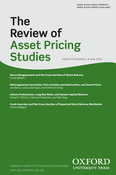
Review of Asset Pricing Studies
Transforming Asset Pricing Studies for Tomorrow's LeadersThe Review of Asset Pricing Studies, published by Oxford University Press, stands as a leading journal in the fields of Economics and Finance, recognized for its rigorous analyses and innovative research since its inception in 2011. This esteemed publication maintains an impressive impact factor and ranks in the Q1 category for both Economics and Finance as of 2023, consistently occupying top positions in Scopus rankings across its relevant categories. With a clear focus on advancing knowledge in asset pricing and investment strategies, the journal serves as a vital platform for researchers, professionals, and students seeking to contribute to and stay informed on the latest developments in these dynamic fields. Despite its lack of open access, the journal ensures wide circulation and accessibility through its reputable publisher, thereby fostering an engaged academic community.
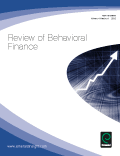
Review of Behavioral Finance
Exploring the Psychology Behind Financial DecisionsReview of Behavioral Finance is a distinguished journal published by Emerald Group Publishing Ltd, focusing on the dynamic interplay of psychology and finance. With an ISSN of 1940-5979 and an E-ISSN of 1940-5987, this journal serves as a pivotal platform for researchers, professionals, and students keen on exploring innovative behavioral financial practices. Operating from the United Kingdom, the journal has made significant strides since its inception in 2009, converging years up to 2024. It is well-regarded in its field, achieving Q2 rankings in Accounting, Finance, and Strategy and Management for 2023, reflecting its influential contributions to these domains. The journal's rigorous peer-review process guarantees the quality of published research, making it an essential resource for academics seeking to enhance their understanding of behavioral finance. While the journal does not currently offer open access, it remains accessible through various academic databases, facilitating the dissemination of vital financial insights. Engage with the cutting-edge research that shapes the future of finance today!
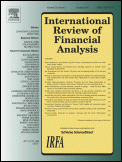
International Review of Financial Analysis
Pioneering high-impact research in finance and economics.The International Review of Financial Analysis, published by Elsevier Science Inc, is a premier journal dedicated to advancing the fields of finance and economics. With an impressive impact factor and ranked in the top quartile (Q1) of both Economics and Econometrics and Finance categories, this journal is recognized for its high-quality research and significant contributions to the discipline. Since its inception in 1992, it has provided a platform for scholars to present innovative theories and empirical studies that address critical financial issues around the globe, making it a vital resource for researchers, professionals, and students alike. Although it does not offer open access, the journal actively engages with contemporary debates in financial analysis, ultimately empowering its readership to contribute to and benefit from the ongoing discourse. With its convergence of financial research and analytical methodologies through 2024, the International Review of Financial Analysis remains a cornerstone in the pursuit of knowledge within the ever-evolving landscape of finance.

Journal of Risk
Advancing Knowledge in Finance and StrategyJournal of Risk, published by INCISIVE MEDIA, serves as an essential platform for scholars and practitioners in the fields of finance and strategic management. With an ISSN of 1465-1211 and an E-ISSN of 1755-2842, this journal explores the multifaceted nature of risk, encompassing theoretical frameworks, empirical investigations, and practical applications. Although currently classified in Q4 for both Finance and Strategy and Management categories as per 2023 standards, it provides a crucial forum for innovative research and thought leadership, addressing the challenges faced in understanding and managing risk in today’s dynamic environment. The journal, based in the United States, is committed to advancing knowledge and offering a platform for debate and dialogue in its convergence years from 2011 to 2024. Researchers, professionals, and students are encouraged to contribute their insights to enhance the academic discourse surrounding risk management.
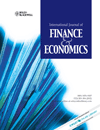
INTERNATIONAL JOURNAL OF FINANCE & ECONOMICS
Advancing Knowledge in Finance and EconomicsInternational Journal of Finance & Economics, published by Wiley, is a premier academic journal that serves as a vital resource for researchers and professionals in the fields of finance, accounting, and economics. With an impressive impact factor and a reputation for excellence, the journal is recognized in the 2023 Scopus rankings, placing in the top quartiles across multiple categories, including Q2 in Accounting, Economics, and Finance. The journal has been a significant contributor to academic discourse since its inception in 1996, with its converged years extending to 2024, thereby ensuring the continuous advancement of knowledge in these critical areas. Although it operates under a traditional subscription model, its comprehensive articles provide insightful analyses, empirical research, and theoretical advancements that cater to a diverse audience—from seasoned scholars to emerging students in the field.

JOURNAL OF FINANCIAL ECONOMICS
Driving impactful dialogue in finance and economics.Welcome to the JOURNAL OF FINANCIAL ECONOMICS, a premier publication in the realms of finance, economics, and accounting, published by Elsevier Science SA in the Netherlands. With its impactful contributions since 1974, this esteemed journal has earned an impressive impact factor and consistently ranks in the Q1 category across various fields, including Accounting, Economics and Econometrics, Finance, and Strategy and Management. Researchers can access cutting-edge studies that delve into both theoretical frameworks and empirical analyses, crucial for advancing financial literacy and economic policies globally. With remarkable Scopus rankings, notably placing #2 in Accounting and #6 in Finance, the journal serves not only as a reliable resource for academics but also as a vital tool for professionals seeking to stay abreast of the latest financial trends and insights. Engage with the latest research and contribute to the dialogue shaping the future of financial economics!
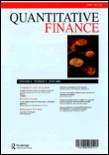
QUANTITATIVE FINANCE
Leading the way in interdisciplinary financial studies.QUANTITATIVE FINANCE, published by Routledge Journals, Taylor & Francis Ltd, stands at the forefront of academic research in the dynamic fields of finance, economics, and econometrics. With a strong commitment to disseminating cutting-edge research, this esteemed journal, which has been published since 2001 and continues to thrive with an anticipated convergence until 2024, occupies a prestigious Q1 ranking in Economics, Econometrics, and Finance and a Q2 ranking in Finance as of 2023. It serves as an essential platform for interdisciplinary studies, aiming to bridge theoretical approaches and practical applications in quantitative methods. Researchers, professionals, and students are provided access to a wealth of high-quality articles that contribute to the ongoing discourse and advancements in these fields. As the journal continues to impact its community, QUANTITATIVE FINANCE remains an invaluable resource for those seeking to stay at the cutting edge of financial research and its applications globally.

JOURNAL OF PORTFOLIO MANAGEMENT
Elevating Financial Discourse through Empirical StudiesJOURNAL OF PORTFOLIO MANAGEMENT is a premier academic journal dedicated to advancing the field of finance through rigorous research focused on investments, asset management, and portfolio strategies. Published by PAGEANT MEDIA LTD in the United States, this journal has established itself as a vital resource for finance professionals and scholars alike, as evidenced by its consistent ranking in the Q2 category across disciplines such as Accounting, Business Management, Economics, and Finance according to the latest categorization. With an emphasis on empirical studies and theoretical advancements since its inception in 1995, the journal remains a key player in the academic landscape, offering insights valuable for both researchers and practitioners. Although not an open-access journal, it provides access to high-quality, peer-reviewed articles that contribute significantly to the discourse on portfolio management. The ISSN for traditional publications is 0095-4918, while the E-ISSN is 2168-8656, ensuring wide-reaching dissemination of complex financial concepts. Immerse yourself in the latest findings to enhance your understanding and application of portfolio management strategies.